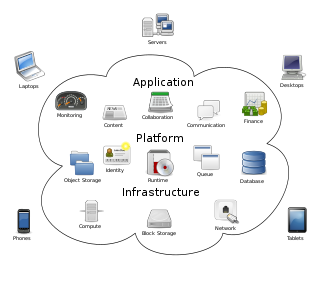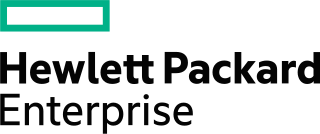
Xunlei Limited is a Chinese multinational technology company and an online service provider founded in 2003. The subsidiary of Xunlei Limited, Shenzhen Xunlei Networking Technologies, Co., Ltd. was formerly known as Sandai Technologies (Shenzhen) Inc. and changed its name to Shenzhen Xunlei Networking Technologies, Co., Ltd. in May 2005. Its headquarters are in Nanshan District, Shenzhen.
Cloud storage is a model of computer data storage in which the digital data is stored in logical pools, said to be on "the cloud". The physical storage spans multiple servers, and the physical environment is typically owned and managed by a hosting company. These cloud storage providers are responsible for keeping the data available and accessible, and the physical environment secured, protected, and running. People and organizations buy or lease storage capacity from the providers to store user, organization, or application data.

Amazon Elastic Compute Cloud (EC2) is a part of Amazon.com's cloud-computing platform, Amazon Web Services (AWS), that allows users to rent virtual computers on which to run their own computer applications. EC2 encourages scalable deployment of applications by providing a web service through which a user can boot an Amazon Machine Image (AMI) to configure a virtual machine, which Amazon calls an "instance", containing any software desired. A user can create, launch, and terminate server-instances as needed, paying by the second for active servers – hence the term "elastic". EC2 provides users with control over the geographical location of instances that allows for latency optimization and high levels of redundancy. In November 2010, Amazon switched its own retail website platform to EC2 and AWS.
Platform as a service (PaaS) or application platform as a service (aPaaS) or platform-based service is a category of cloud computing services that allows customers to provision, instantiate, run, and manage a modular bundle comprising a computing platform and one or more applications, without the complexity of building and maintaining the infrastructure typically associated with developing and launching the application(s), and to allow developers to create, develop, and package such software bundles.

Cloud computing is the on-demand availability of computer system resources, especially data storage and computing power, without direct active management by the user. Large clouds often have functions distributed over multiple locations, each of which is a data center. Cloud computing relies on sharing of resources to achieve coherence and typically uses a pay-as-you-go model, which can help in reducing capital expenses but may also lead to unexpected operating expenses for users.

Microsoft Azure, often referred to as Azure, is a cloud computing platform run by Microsoft. It offers access, management, and the development of applications and services through global data centers. It also provides a range of capabilities, including software as a service (SaaS), platform as a service (PaaS), and infrastructure as a service (IaaS). Microsoft Azure supports many programming languages, tools, and frameworks, including Microsoft-specific and third-party software and systems.
Mobile Cloud Computing (MCC) is the combination of cloud computing and mobile computing to bring rich computational resources to mobile users, network operators, as well as cloud computing providers. The ultimate goal of MCC is to enable execution of rich mobile applications on a plethora of mobile devices, with a rich user experience. MCC provides business opportunities for mobile network operators as well as cloud providers. More comprehensively, MCC can be defined as "a rich mobile computing technology that leverages unified elastic resources of varied clouds and network technologies toward unrestricted functionality, storage, and mobility to serve a multitude of mobile devices anywhere, anytime through the channel of Ethernet or Internet regardless of heterogeneous environments and platforms based on the pay-as-you-use principle."
Google Cloud Platform offers numerous integrated cloud-computing services, including compute, network, and storage.
A cloud database is a database that typically runs on a cloud computing platform and access to the database is provided as-a-service. There are two common deployment models: users can run databases on the cloud independently, using a virtual machine image, or they can purchase access to a database service, maintained by a cloud database provider. Of the databases available on the cloud, some are SQL-based and some use a NoSQL data model.

Cloud computing architecture refers to the components and subcomponents required for cloud computing. These components typically consist of a front end platform, back end platforms, a cloud based delivery, and a network. Combined, these components make up cloud computing architecture.
Google Compute Engine (GCE) is the Infrastructure as a Service (IaaS) component of Google Cloud Platform which is built on the global infrastructure that runs Google's search engine, Gmail, YouTube and other services. Google Compute Engine enables users to launch virtual machines (VMs) on demand. VMs can be launched from the standard images or custom images created by users. GCE users must authenticate based on OAuth 2.0 before launching the VMs. Google Compute Engine can be accessed via the Developer Console, RESTful API or command-line interface (CLI).
HP CloudSystem is a cloud infrastructure from Hewlett Packard Enterprise (HPE) that combines storage, servers, networking and software.

HP Cloud was a set of cloud computing services available from Hewlett-Packard that offered public cloud, private cloud, hybrid cloud, managed private cloud and other cloud services. It was the combination of the previous HP Converged Cloud business unit and HP Cloud Services, an OpenStack-based public cloud. It was marketed to enterprise organizations to combine public cloud services with internal IT resources to create hybrid clouds, or a mix of private and public cloud environments, from around 2011 until 2016.

Gridcentric, Inc. was a software company that provided virtualization technology for datacenters. The company's flagship product, Virtual Memory Streaming (VMS) reduced boot time, memory footprint and operating costs for virtual machines in the cloud.
Google Cloud Platform (GCP), offered by Google, is a suite of cloud computing services that provides a series of modular cloud services including computing, data storage, data analytics and machine learning, alongside a set of management tools. It runs on the same infrastructure that Google uses internally for its end-user products, such as Google Search, Gmail, and Google Docs, according to Verma, et.al. Registration requires a credit card or bank account details.

HPE Helion was Hewlett-Packard's portfolio of open-source software and integrated systems for enterprise cloud computing. It was announced by HPE Cloud in May 2014. HPE Helion grew from under US$300 million to over US$3 billion by 2016. HP closed the public cloud business on 31 January 2016. HP has hybrid cloud and other offerings but the Helion public cloud offering was shut down.
Cloud management is the management of cloud computing products and services.
Content as a service (CaaS) or managed content as a service (MCaaS) is a service-oriented model, where the service provider delivers the content on demand to the service consumer via web services that are licensed under subscription. The content is hosted by the service provider centrally in the cloud and offered to a number of consumers that need the content delivered into any applications or system, hence content can be demanded by the consumers as and when required.
Serverless computing is a cloud computing execution model in which the cloud provider allocates machine resources on demand, taking care of the servers on behalf of their customers. "Serverless" is a misnomer in the sense that servers are still used by cloud service providers to execute code for developers. However, developers of serverless applications are not concerned with capacity planning, configuration, management, maintenance, fault tolerance, or scaling of containers, VMs, or physical servers. Serverless computing does not hold resources in volatile memory; computing is rather done in short bursts with the results persisted to storage. When an app is not in use, there are no computing resources allocated to the app. Pricing is based on the actual amount of resources consumed by an application. It can be a form of utility computing.
Cloud-based quantum computing is the invocation of quantum emulators, simulators or processors through the cloud. Increasingly, cloud services are being looked on as the method for providing access to quantum processing. Quantum computers achieve their massive computing power by initiating quantum physics into processing power and when users are allowed access to these quantum-powered computers through the internet it is known as quantum computing within the cloud.






